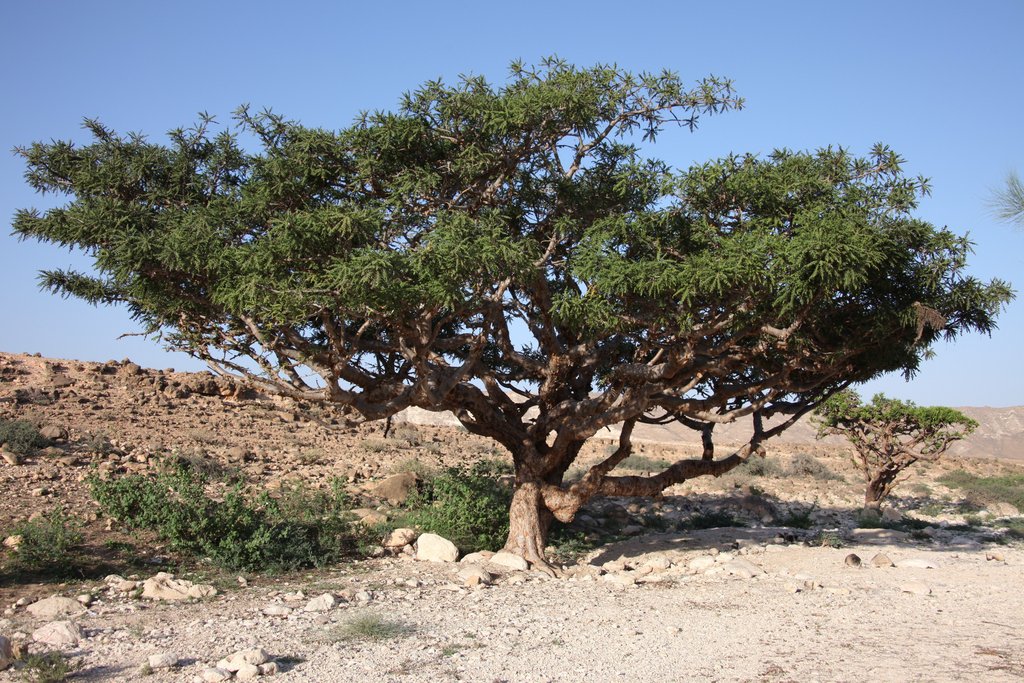Current Affairs
Uses Of The Gifl Gum Incense And Timber
08 March, 2020
KHARTOUM (Sudanow) - Sudan is a major producer of prank incense, obtained from the boswelliacarteil tree, a burseracerae tree species.
The tree grows heavily in the regions of Darfur (far west), the Nuba Mountains (mid-west) and the Blue Nile (southeast).
Both the gum obtained from this tree and its timber are of high economic return, both for the citizens who tap the gum or the indigenous population who benefit from the timber.
The tree, known in Sudan as Algifl, is medium – sized, pale in color, branchy and sheds its leaves in hot weather (summer).
But Algifl tree, like many other Savannah trees, has the characteristic of storing a lot of water to keep it alive during the summer. 
In addition, the tree is highly thorny and grows thick humid bark on its trunk and branches. By this definition, this bark stores a big amount of water. The bark is covered with a waxy coating that gives it a tender touch.
The tree is obtainable easily through vegetative multiplication, contrary to what happens in other Savannah trees. All is needed is to cut a branch and plant it in the soil.
Because of that, the Baqqara tribes people grow these trees to use their branches on happy occasions, weddings and mourning.
On the wedding day, the youths fetch these branches to build a temporary home (shack) for the new weds. This home is a semi-spherical structure used during the brief period of the wedding celebrations.
The algifl tree is also associated with some folktales. The inhabitants of Kordofan and Darfur regions circulate the idea that the River Nile originally flew across Darfur and that the Nubian civilization had started in Darfur before the Nubian Kingdom moved Northwards, to today’s Nubia in the far North. The story also says the Darfur people had used to use palm branches on social occasions. Even in funerals they used to put the palm tree branches beside the deceased on the coffin and on the grave.
But when civilization shifted northwards, and date palm trees stopped growing in Darfur, because the Nile had changed course, they replaced the palm branches with the algifl branches on their social occasions: weddings, mourning and circumcision.
The algifil timber is light in weight. That characteristic makes it easy to manufacture it into perfume pots, saddles, shoe baseboards, pencils, air condition straw, musical instruments and packing boxes.
The Bija communities of Eastern Sudan had engaged for a long time in the trade of prank incense. Once the rainy season is over and the algifil trees become ready to give the gum, the Bija men travel all this long distance to the algifil habitats in the West to tap and collect it.
Inhabitants of the African Horn and Yemen also trade in this product.
The tapping, collection and cleaning of this gum requires a special expertise. The Bijas are also knowledgeable in its sampling, in keeping with international standards.
The algifil gum has a lot of medical benefits. The effective substance in this product is resin with a pleasant smell. Its taste is a little bit bitter and contains volatile oils.
One characteristic of resin is a stimulant and is useful in soar throats and bronchitis. The locals boil a little quantity of it in water and drink it.
It also enters in the making of wound dressings and plasters and in the preparation of smoke powders and the making of cosmetics. It is
present in most households as an effective incense and could be obtained at an affordable price.
E N D
YH/AS
Photo of the Week
Everybody alive today came from one African country (The Independent) Ariana Baio Khartoum, Jan.1 (Sudanow)-It is well known that all humans alive today can be traced back to a common ancestor but a study may have found where that ancestor originates. Researchers at the University of Oxford’s Big Data Institute mapped the entirety of genetic relationships among humans t...
MoreNew media
The Poll
Archives
-
01 January, 2023
Phone battery killed nine persons, injured twelve
Zalingei, Jan.1 (Sudanow) - A dispute over a phone battery, in Marin Market, Central Darfur, led to the killing of nine persons and injuring of another twelve. The Director of Central Darfur Police, Salah Omar Al-Tayeb told SUNA last Thursday that main reasons behind the events in Zalingei began with a dispute over a phone battery, where one of the citizens stabbed to death. The police official added that the police forces moved to th...
Sudanow is the longest serving English speaking magazine in the Sudan. It is chartarized by its high quality professional journalism, focusing on political, social, economic, cultural and sport developments in the Sudan. Sudanow provides in depth analysis of these developments by academia, highly ...
MoreRecent tweets
Tweets by Suda_nowFOLLOW Us On Facebook
Contact Us

Address: Sudan News Agency (SUNA) Building, Jamhoria Street, Khartoum - Sudan
Mobile:+249 909220011 / +249 912307547







